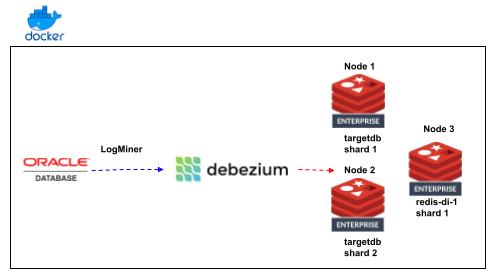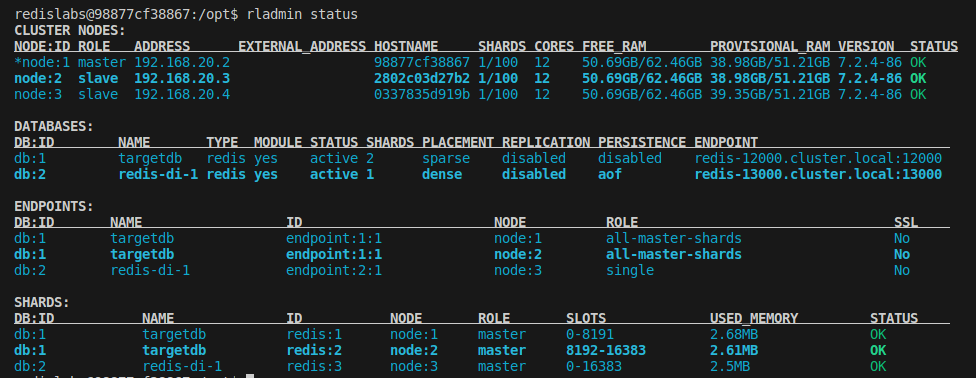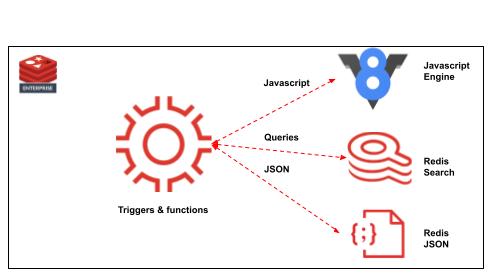- Summary
- Architecture
- Data Set in Redis Insight
- Features
- Prerequisites
- Installation
- Usage
- Scenario 1
- Scenario 2
- Scenario 3
- Scenario 4
- Scenario 5
- Scenario 6
- Scenario 7
- Scenario 8
This is a series of comparisons of equivalent SQL and Redis Search commands against the Chinook dataset. Oracle Enterprise (OE) is used as the relational database with Redis Data Integration (RDI) used to populate a Redis Enterprise (RE) database via Change Data Capture (CDC.)
- Builds out a full RE with RDI and OE environment to include: 3-node RE Cluster, 1-node OE, RDI, and Debezium.
- Ubuntu 20.x
- Docker Compose
- Docker
- Command line tools: curl, wget
git clone https://github.com/Redislabs-Solution-Architects/search-sql.git && cd search-sql && npm install./start.sh./stop.shWhich countries have the most Invoices?
SELECT BillingCountry,
COUNT(*) AS Invoices
FROM Invoice
GROUP BY BillingCountry
ORDER BY Invoices DESC
FETCH FIRST 5 ROWS ONLY;BILLINGCOUNTRY INVOICES
---------------------------------------- ----------
USA 91
Canada 56
France 35
Brazil 35
Germany 28
FT.CREATE idx ON JSON PREFIX 1 invoice: SCHEMA $.BILLINGCOUNTRY AS BillingCountry TAGFT.AGGREGATE idx * GROUPBY 1 @BillingCountry REDUCE COUNT 0 AS Invoices SORTBY 2 @Invoices DESC LIMIT 0 51) "23"
2) 1) "BillingCountry"
2) "USA"
3) "Invoices"
4) "91"
3) 1) "BillingCountry"
2) "Canada"
3) "Invoices"
4) "56"
4) 1) "BillingCountry"
2) "Brazil"
3) "Invoices"
4) "35"
5) 1) "BillingCountry"
2) "France"
3) "Invoices"
4) "35"
6) 1) "BillingCountry"
2) "Germany"
3) "Invoices"
4) "28"
Which city has the best customers?
SELECT BillingCity, SUM(Total) AS InvoiceDollars
FROM Invoice
GROUP BY BillingCity
ORDER BY InvoiceDollars DESC
FETCH FIRST 7 ROWS ONLY;BILLINGCITY INVOICEDOLLARS
---------------------------------------- --------------
Prague 90.24
Paris 77.24
Mountain View 77.24
Berlin 75.24
S??o Paulo 75.24
London 75.24
Fort Worth 47.62
FT.CREATE idx ON JSON PREFIX 1 invoice: SCHEMA $.BILLINGCITY AS BillingCity TAG $.TOTAL AS Total NUMERICFT.AGGREGATE idx * GROUPBY 1 @BillingCity REDUCE SUM 1 @Total AS InvoiceDollars SORTBY 2 @InvoiceDollars DESC LIMIT 0 71) "52"
2) 1) "BillingCity"
2) "Prague"
3) "InvoiceDollars"
4) "90.24"
3) 1) "BillingCity"
2) "Paris"
3) "InvoiceDollars"
4) "77.24"
4) 1) "BillingCity"
2) "Mountain View"
3) "InvoiceDollars"
4) "77.24"
5) 1) "BillingCity"
2) "Berlin"
3) "InvoiceDollars"
4) "75.24"
6) 1) "BillingCity"
2) "S\xef\xbf\xbd\xef\xbf\xbdo Paulo"
3) "InvoiceDollars"
4) "75.24"
7) 1) "BillingCity"
2) "London"
3) "InvoiceDollars"
4) "75.24"
8) 1) "BillingCity"
2) "Fort Worth"
3) "InvoiceDollars"
4) "47.62"
Who is the best customer?
SELECT CustomerId, SUM(Total) AS Money_Spent
FROM Invoice
GROUP BY CustomerId
ORDER BY Money_Spent DESC
FETCH FIRST 1 ROWS ONLY;CUSTOMERID MONEY_SPENT
---------- -----------
6 49.62
FT.CREATE idx ON JSON PREFIX 1 invoice: SCHEMA $.CUSTOMERID AS CustomerId NUMERIC $.TOTAL AS Total NUMERICFT.AGGREGATE idx * GROUPBY 1 @CustomerId REDUCE SUM 1 @Total AS Money_Spent SORTBY 2 @Money_Spent DESC LIMIT 0 11) "58"
2) 1) "CustomerId"
2) "6"
3) "Money_Spent"
4) "49.62"
Which tracks have a song length longer than the average song length?
SELECT Name, Milliseconds
FROM Track
WHERE Milliseconds > (SELECT AVG(Milliseconds) FROM Track)
ORDER BY Milliseconds DESC
FETCH FIRST 5 ROWS ONLY; NAME MILLISECONDS
------------------------------ ------------
Occupation / Precipice 5286953
Through a Looking Glass 5088838
Greetings from Earth, Pt. 1 2960293
The Man With Nine Lives 2956998
Battlestar Galactica, Pt. 2 2956081
FT.CREATE idx ON JSON PREFIX 1 track: SCHEMA $.MILLISECONDS AS Milliseconds NUMERIC SORTABLEFT.AGGREGATE idx * GROUPBY 0 REDUCE AVG 1 @Milliseconds AS avg
FT.SEARCH idx "@Milliseconds:[393599.212104 +inf]" RETURN 2 $.NAME $.MILLISECONDS SORTBY Milliseconds DESC LIMIT 0 51) "1"
2) 1) "avg"
2) "393599.212104"
1) "494"
2) "track:TRACKID:2820"
3) 1) "$.NAME"
2) "Occupation / Precipice"
3) "$.MILLISECONDS"
4) "5286953"
4) "track:TRACKID:3224"
5) 1) "$.NAME"
2) "Through a Looking Glass"
3) "$.MILLISECONDS"
4) "5088838"
6) "track:TRACKID:3244"
7) 1) "$.NAME"
2) "Greetings from Earth, Pt. 1"
3) "$.MILLISECONDS"
4) "2960293"
8) "track:TRACKID:3242"
9) 1) "$.NAME"
2) "The Man With Nine Lives"
3) "$.MILLISECONDS"
4) "2956998"
10) "track:TRACKID:3227"
11) 1) "$.NAME"
2) "Battlestar Galactica, Pt. 2"
3) "$.MILLISECONDS"
4) "2956081"
Find the first 5 customers by Id who are not in the US.
SELECT CustomerId, FirstName, LastName, Country
FROM Customer
WHERE not Country = 'USA'
ORDER BY CustomerId ASC
FETCH FIRST 5 ROWS ONLY;CUSTOMERID FIRSTNAME LASTNAME COUNTRY
---------- ---------------------------------------- -------------------- ----------------------------------------
1 Lu??s Gon??alves Brazil
2 Leonie K??hler Germany
3 Fran??ois Tremblay Canada
4 Bj??rn Hansen Norway
5 Franti??ek Wichterlov?? Czech Republic
FT.CREATE idx ON JSON PREFIX 1 customer: SCHEMA $.COUNTRY AS Country TAG $.CUSTOMERID AS CustomerId NUMERIC SORTABLEFT.SEARCH idx "-@Country:{USA}" RETURN 4 $.CUSTOMERID $.FIRSTNAME $.LASTNAME $.COUNTRY SORTBY CustomerId LIMIT 0 51) "45"
2) "customer:CUSTOMERID:1"
3) 1) "$.CUSTOMERID"
2) "1"
3) "$.FIRSTNAME"
4) "Lu\xef\xbf\xbd\xef\xbf\xbds"
5) "$.LASTNAME"
6) "Gon\xef\xbf\xbd\xef\xbf\xbdalves"
7) "$.COUNTRY"
8) "Brazil"
4) "customer:CUSTOMERID:2"
5) 1) "$.CUSTOMERID"
2) "2"
3) "$.FIRSTNAME"
4) "Leonie"
5) "$.LASTNAME"
6) "K\xef\xbf\xbd\xef\xbf\xbdhler"
7) "$.COUNTRY"
8) "Germany"
6) "customer:CUSTOMERID:3"
7) 1) "$.CUSTOMERID"
2) "3"
3) "$.FIRSTNAME"
4) "Fran\xef\xbf\xbd\xef\xbf\xbdois"
5) "$.LASTNAME"
6) "Tremblay"
7) "$.COUNTRY"
8) "Canada"
8) "customer:CUSTOMERID:4"
9) 1) "$.CUSTOMERID"
2) "4"
3) "$.FIRSTNAME"
4) "Bj\xef\xbf\xbd\xef\xbf\xbdrn"
5) "$.LASTNAME"
6) "Hansen"
7) "$.COUNTRY"
8) "Norway"
10) "customer:CUSTOMERID:5"
11) 1) "$.CUSTOMERID"
2) "5"
3) "$.FIRSTNAME"
4) "Franti\xef\xbf\xbd\xef\xbf\xbdek"
5) "$.LASTNAME"
6) "Wichterlov\xef\xbf\xbd\xef\xbf\xbd"
7) "$.COUNTRY"
8) "Czech Republic"
Which employees are Sales Agents?
SELECT LastName, FirstName FROM Employee
WHERE Employee.Title = 'Sales Support Agent';LASTNAME FIRSTNAME
-------------------- --------------------
Peacock Jane
Park Margaret
Johnson Steve
FT.CREATE idx ON JSON PREFIX 1 employee: SCHEMA $.TITLE AS Title TAGFT.SEARCH idx "@Title:{Sales Support Agent}" RETURN 2 $.LASTNAME $.FIRSTNAME1) "3"
2) "employee:EMPLOYEEID:3"
3) 1) "$.LASTNAME"
2) "Peacock"
3) "$.FIRSTNAME"
4) "Jane"
4) "employee:EMPLOYEEID:4"
5) 1) "$.LASTNAME"
2) "Park"
3) "$.FIRSTNAME"
4) "Margaret"
6) "employee:EMPLOYEEID:5"
7) 1) "$.LASTNAME"
2) "Johnson"
3) "$.FIRSTNAME"
4) "Steve"
What is the count of line items for Invoice ID 37?
SELECT COUNT(InvoiceLineId)
FROM InvoiceLine
WHERE InvoiceId = 37;COUNT(INVOICELINEID)
--------------------
4
FT.CREATE idx ON JSON PREFIX 1 invoiceline: SCHEMA $INVOICEID AS InvoiceId NUMERICFT.AGGREGATE idx "@InvoiceId:[37 37]" GROUPBY 0 REDUCE COUNT 0 as Count1) "1"
2) 1) "Count"
2) "4"
Which artists have written the most Rock music?
SELECT Artist.ArtistId AS artistId, Artist.Name AS name, COUNT(Track.Name) AS Songs
FROM Artist
JOIN Album ON Album.ArtistId = Artist.ArtistId
JOIN Track ON Album.AlbumId = Track.AlbumId
JOIN Genre ON Track.GenreId = Genre.GenreId WHERE Genre.Name = 'Rock'
GROUP BY Artist.ArtistId, Artist.Name, Genre.Name
ORDER BY Songs DESC
FETCH FIRST 10 ROWS ONLY; ARTISTID NAME SONGS
---------- ------------------------------ ----------
22 Led Zeppelin 114
150 U2 112
58 Deep Purple 92
90 Iron Maiden 81
118 Pearl Jam 54
152 Van Halen 52
51 Queen 45
142 The Rolling Stones 41
76 Creedence Clearwater Revival 40
52 Kiss 35
In this case, we build a materialized view of the same SELECT/JOIN above. Debezium, and subsequently RE/RDI, can perform CDC on this view if we also turn on Logminer for the view and create a primary key.
CREATE MATERIALIZED VIEW RockView
BUILD IMMEDIATE
AS
SELECT Artist.ArtistId AS artistId, Artist.Name AS name, COUNT(Track.Name) AS Songs
FROM Artist
JOIN Album ON Album.ArtistId = Artist.ArtistId
JOIN Track ON Album.AlbumId = Track.AlbumId
JOIN Genre ON Track.GenreId = Genre.GenreId WHERE Genre.Name = 'Rock'
GROUP BY Artist.ArtistId, Artist.Name, Genre.Name
ORDER BY Songs DESC;
ALTER TABLE CHINOOK.ROCKVIEW ADD SUPPLEMENTAL LOG DATA (ALL) COLUMNS;
ALTER MATERIALIZED VIEW RockView ADD CONSTRAINT PK_RockVIEW PRIMARY KEY (ArtistId);SELECT * FROM RockView
FETCH FIRST 10 ROWS ONLY; ARTISTID NAME SONGS
---------- ------------------------------ ----------
22 Led Zeppelin 114
150 U2 112
58 Deep Purple 92
90 Iron Maiden 81
118 Pearl Jam 54
152 Van Halen 52
51 Queen 45
142 The Rolling Stones 41
76 Creedence Clearwater Revival 40
52 Kiss 35
In this option, we make use of the CDC of the materialized view created above. It's important to note this method of performing Redis Search against an equivalent SQL JOIN will only work with Oracle. Materialized views and/or CDC of them does not work with Postgres, MySQL, MSSQL.
FT.CREATE idx ON JSON PREFIX 1 rockview: SCHEMA $.SONGS AS SONGS NUMERIC SORTABLEFT.SEARCH idx * SORTBY SONGS DESC LIMIT 0 101) "51"
2) "rockview:ARTISTID:22"
3) 1) "SONGS"
2) "114"
3) "$"
4) "{\"ARTISTID\":22,\"NAME\":\"Led Zeppelin\",\"SONGS\":114}"
4) "rockview:ARTISTID:150"
5) 1) "SONGS"
2) "112"
3) "$"
4) "{\"ARTISTID\":150,\"NAME\":\"U2\",\"SONGS\":112}"
6) "rockview:ARTISTID:58"
7) 1) "SONGS"
2) "92"
3) "$"
4) "{\"ARTISTID\":58,\"NAME\":\"Deep Purple\",\"SONGS\":92}"
8) "rockview:ARTISTID:90"
9) 1) "SONGS"
2) "81"
3) "$"
4) "{\"ARTISTID\":90,\"NAME\":\"Iron Maiden\",\"SONGS\":81}"
10) "rockview:ARTISTID:118"
11) 1) "SONGS"
2) "54"
3) "$"
4) "{\"ARTISTID\":118,\"NAME\":\"Pearl Jam\",\"SONGS\":54}"
12) "rockview:ARTISTID:152"
13) 1) "SONGS"
2) "52"
3) "$"
4) "{\"ARTISTID\":152,\"NAME\":\"Van Halen\",\"SONGS\":52}"
14) "rockview:ARTISTID:51"
15) 1) "SONGS"
2) "45"
3) "$"
4) "{\"ARTISTID\":51,\"NAME\":\"Queen\",\"SONGS\":45}"
16) "rockview:ARTISTID:142"
17) 1) "SONGS"
2) "41"
3) "$"
4) "{\"ARTISTID\":142,\"NAME\":\"The Rolling Stones\",\"SONGS\":41}"
18) "rockview:ARTISTID:76"
19) 1) "SONGS"
2) "40"
3) "$"
4) "{\"ARTISTID\":76,\"NAME\":\"Creedence Clearwater Revival\",\"SONGS\":40}"
20) "rockview:ARTISTID:52"
21) 1) "SONGS"
2) "35"
3) "$"
4) "{\"ARTISTID\":52,\"NAME\":\"Kiss\",\"SONGS\":35}"
In this option, we use a Redis Function to perform the data gathering. The function is written in Javascript and executes in a V8 interpreter on Redis.
try {
await redis.ft.create(GENRE_INDEX, {
'$.NAME': {
type: SchemaFieldTypes.TAG,
AS: 'name'
}
},{ ON: 'JSON', PREFIX: 'genre:' }
);
await poll(redis, GENRE_INDEX);
}
catch (err) {
if (err.message !== 'Index already exists') {
console.error(err);
process.exit(1);
}
}
try {
await redis.ft.create(TRACK_INDEX, {
'$.GENREID': {
type: SchemaFieldTypes.NUMERIC,
AS: 'genreId'
}
},{ ON: 'JSON', PREFIX: 'track:' }
);
await poll(redis, TRACK_INDEX);
}
catch (err) {
if (err.message !== 'Index already exists') {
console.error(err);
process.exit(1);
}
}TFCALLASYNC artist.fetch 0 Rock 101) 1) "ARTISTID"
2) "22"
3) "SONGS"
4) "114"
5) "NAME"
6) "Led Zeppelin"
2) 1) "SONGS"
2) "112"
3) "ARTISTID"
4) "150"
5) "NAME"
6) "U2"
3) 1) "NAME"
2) "Deep Purple"
3) "ARTISTID"
4) "58"
5) "SONGS"
6) "92"
4) 1) "ARTISTID"
2) "90"
3) "NAME"
4) "Iron Maiden"
5) "SONGS"
6) "81"
5) 1) "NAME"
2) "Pearl Jam"
3) "ARTISTID"
4) "118"
5) "SONGS"
6) "54"
6) 1) "NAME"
2) "Van Halen"
3) "ARTISTID"
4) "152"
5) "SONGS"
6) "52"
7) 1) "ARTISTID"
2) "51"
3) "SONGS"
4) "45"
5) "NAME"
6) "Queen"
8) 1) "ARTISTID"
2) "142"
3) "NAME"
4) "The Rolling Stones"
5) "SONGS"
6) "41"
9) 1) "ARTISTID"
2) "76"
3) "NAME"
4) "Creedence Clearwater Revival"
5) "SONGS"
6) "40"
10) 1) "ARTISTID"
2) "52"
3) "NAME"
4) "Kiss"
5) "SONGS"
6) "35"




